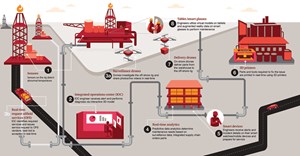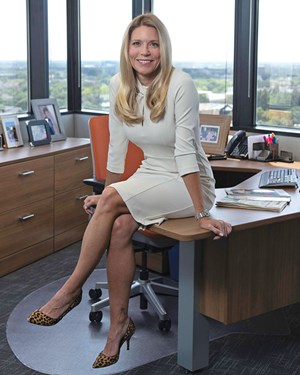Despite a challenging environment, the OFS sector has a major role in energy’s future
World economies have been in turmoil this year because of the Covid-19 pandemic, and the oilfield services and equipment sector has taken an enormous hit. As we enter the fourth quarter of 2020, World Oil talked with Leslie Beyer, president of the Petroleum Equipment & Services Association (PESA) about the sector’s future and how PESA is supporting its members.
World Oil (WO): How have OFS companies been affected by the economic downturn this year?
Leslie Beyer (LB): The OFS sector actually felt a triple impact of commodity price wars, Covid-driven demand reduction and simultaneous oversupply. All these factors combined to force cutbacks in production, capital investments and employment. PESA research shows that September OFS employment was down 121,000 jobs from 2019 levels, and more than 106,000 jobs were lost due to the pandemic.
The good news is that rig counts are edging up, oil prices are low but stable, and employment losses have flattened. We are still facing continued uncertainty around the economic recovery as Covid cases rise, but we are encouraged by signs of activity.
WO: There’s talk about the pandemic causing permanent changes. What can we expect in OFS?
LB: The OFS sector has always been at the vanguard of innovation and implementation of technology, and in this capacity will be at the forefront of the transition to a lower-carbon energy future. What we’re seeing across the sector is an acceleration of changes that were already underway.
For example, the pandemic imposed an immediate need for companies to implement social distancing and remote work practices. In many cases, plans were already in place, but over a longer timeframe. Those changes are happening now, and we’re seeing development around remote capabilities, big data, internet of things, virtual reality, 3D imaging and more. An engineer controlling operations on a rig in the Permian basin from her home office in Houston isn’t a sci-fi fantasy—it’s a reality.
The implementation of technology is also shifting what companies need from future employees and changing the composition of the OFS workforce. Because of huge strides in digitalization (Fig. 1), the OFS workforce of the future is leaner and highly technical. We have a great task ahead of us to recruit the innovative men and women, who will lead us to a new energy future. There will be great opportunities in the OFS for geologists, geophysicists, data analysts, engineers, programmers, designers and more. The OFS sector will be home to high-tech, high-paying jobs.

WO: You mentioned energy transition. What’s the OFS sector’s role?
LB: Energy transition is not about replacing one form of energy with another, it’s about the entire energy ecosystem working together to provide clean, safe and affordable power.
As a society, we need to be smart and realistic about the transition. Energy demand is going to increase 25% by 2040, which means we can’t just turn our backs on oil and gas. We’re also going to need the expertise to scale technological solutions. That expertise is in the men and women of the OFS. We’re all concerned about climate change and the environment. We all want the best for our kids and grandkids. That means employing existing technologies to make oil and gas cleaner, and developing new technologies to reduce carbon and greenhouse gas emissions to the lowest levels possible.
Because of the growing need for energy around the globe—especially in developing economies—oil and gas will be part of the fuel portfolio for the foreseeable future. We can, and we will, make it cleaner to produce and use. We’re already making progress. From 2005 to 2017, U.S. electricity generation increased 4%, while related CO2 emissions fell 27%. Much of that drop was the result of switching from coal to gas.
PESA formed our Energy Transition Committee in 2019 to guide our sector’s efforts, share new technologies, help members address emissions and prepare for the future. As an association, we’re promoting the tremendous technology and expertise offered by PESA member companies and finding new growth opportunities. This was a major theme of our (Washington) D.C. Fly-In earlier this year, and lawmakers appreciated the chance to learn more about our sector’s achievements and advancements.
It’s critical for oil and gas companies to be clear, publicly, that we’re playing a key part in the transition. We have multiple events in the fall discussing the OFS role in energy transition, and providing an opportunity to hear directly from investors on their perspectives. Anyone interested can visit PESA.org for more information.
WO: Investors are increasingly interested in a company’s practices across dimensions of environmental, social and corporate governance (ESG). What is PESA doing on that front?
LB: We’re committed to providing our sector with up-to-date resources, to manage an evolving ESG landscape. We founded our ESG Center of Excellence this year, to serve as a clearinghouse for companies looking for information, tools and best practices. We’re also presenting an ESG Knowledge Sharing Certification Program, which educates members and cross-industry partners on ESG criteria and reporting requirements across each of the three dimensions.
This year, we’re focusing on providing practical short-term guidelines that build toward long-term strategies responding to the desires of ESG investors. The program includes an assessment tool that helps executives understand where their companies are on the journey, seminars on each dimension and mentoring. Participants will complete the program with a thorough understanding of ESG and how to implement sustainable practices within their companies.
PESA’s member-driven ESG Committee was founded two years ago, with a mission to educate and promote best practices among PESA members. The committee’s role is also to share positive steps from our sector with policymakers and the general public. We’re pushing against negative perceptions of oil and gas production. This is an innovative industry that’s made significant changes in how it operates and is reinventing itself to be cleaner and more sustainable. It’s important for policymakers and the general public to see that.
WO: Inclusion and diversity are big issues in America this year. What is PESA working on in this area?
LB: PESA started with our groundbreaking 2018 gender diversity study of the OFS sector, which laid out in plain terms how much our sector can improve—women held only 16% of OFS jobs.
Building on that report, we created a toolkit giving members additional information to understand implications of the findings, a diversity index for companies to measure where they are, and specific actions companies can take to make a sustainable and meaningful change.
We’re currently in the midst of PESA’s Inclusion & Diversity Business Champion program that guides participants through the process of developing action plans to initiate change within their own companies. When racial equality and social justice became a major issue this summer, we re-opened enrollment, so even more members could participate.
Our newly created Racial Equality Task Force is also creating recommendations that members can follow to develop a company culture that values diversity. This isn’t just a hiring issue—there are a number of ways that companies can support inclusion and diversity among their current employees and in their operations.
Earlier, we talked about the need for a new kind of worker in our sector. That means attracting the brightest and most talented people we can find. It’s in our best interest to cast the widest net possible. Plus, research shows that companies with a commitment to diversity perform better in terms of gaining market share and higher profitability.
WO: How is PESA adapting to the pandemic environment?
LB: Like it’s been for our members around the world, transitioning the way we deliver value has been a challenge. One of PESA’s greatest assets is the ability to bring the sector together and share intelligence. We were concerned that this could slip with in-person meetings out of the question, but we were able to actually strengthen our reach by transitioning quickly to remote meetings, webinars and townhalls.
We’ve produced more than 100 virtual events, providing members with forums to discuss critical issues around pandemic operations; gather information and resources about managing in this environment; interact with and educate elected officials around our specific stimulus needs; and engage in structured networking.
We developed a remote networking and knowledge-sharing format so successful that we’re transitioning all of our workforce development courses to remote format. For the remainder of 2020 and through 2021, all of our signature development courses—Diversity & Inclusion, ESG, Executive Leadership Program and Oil & Gas 101—will have a digital option, enabling effective and low-cost training for our members all over the globe.
Our government relations team has also taken on a more aggressive advocacy role. We keep our finger on the pulse of federal, state and local policy proposals that could uniquely affect the OFS sector. Our members have conducted multiple visits with members of Congress and administration officials, as well as submit detailed comments on federal regulations. Finally, in one of the most impactful activities for our members this year, PESA successfully submitted and won multiple tariff product exclusions for OFS companies, saving them tens of millions of dollars.
No matter the level of government, no matter the issue or the venue, you can be sure PESA will be there fighting for the interests of the oilfield sector.
Editor’s note: The Petroleum Equipment & Services Association (PESA) is the nationaltrade association for the oilfield services andequipment sector, representing nearly 700,000 jobs in the technology-driven energy value chain. PESA works to advance member policy priorities and provide targeted workforce development for the OFS sector.
Related Articles- Regional Report: Focus on Arctic oil and gas sharpened during 2025 (January)
- What's new in exploration: A fresh look at Venezuela with the benefit of hindsight (January)
- Drilling advances: Bottlenecks? What bottlenecks? (January)
- What's new in production: Welcome diversion? (December 2025)
- Flexibility and modularity enable tailored solutions for challenging shale plays (December 2025)
- Keeping the Gulf of America as our energy anchor (December 2025)
- Subsea technology- Corrosion monitoring: From failure to success (February 2024)
- Applying ultra-deep LWD resistivity technology successfully in a SAGD operation (May 2019)
- Adoption of wireless intelligent completions advances (May 2019)
- Majors double down as takeaway crunch eases (April 2019)
- What’s new in well logging and formation evaluation (April 2019)
- Qualification of a 20,000-psi subsea BOP: A collaborative approach (February 2019)



